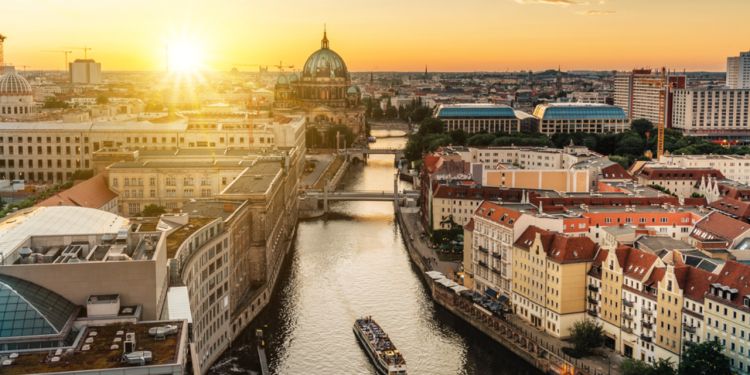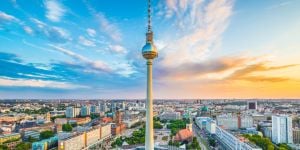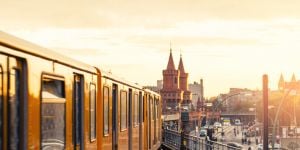
Berlin, the capital of Germany, is an enchanting city full of culture, history, great food, diversity, and nature. As far as destinations for expats go, you can't get much better than Berlin (as long as you're not looking for sunshine every day).
It's one of the largest cities in Europe, meaning there's a wonderful mix of cultures, architecture, and traditions in the city. It's also centrally located and is the perfect base to explore lots of Eastern and Western Europe (via bus, train, or plane).
Understandably, if you're thinking of moving to Berlin, you're going to have lots of questions about life there. In this guide, we're going to give you the basics of this amazing city so you know what to expect upon arrival and can settle in quickly.
Ten things to know before moving to Berlin
Did you know Berlin has the longest open-air gallery in the world? Or more bridges than Venice (1,700 in total!)? It's world-famous for its nightlife, with DJs from every country hoping to play in some of the biggest nightclubs and festivals in the city. It also has a huge number of museums, parks, incredible restaurants, and amazing facilities such as shops, hospitals, and cultural activities.
#1 Berlin is different from the rest of Germany
Berlin is known for being completely unique. In fact, that's one of the reasons so many expats choose to go to the city in the first place. Art is key in Berlin, whether you see it in some of the stunning graffiti on the street or in one of the world-renowned art galleries. It's also a very open-minded city and definitely not as conventional as other cities in the country. For example, people are free to express themselves in their clothes and personal appearance, and it's common for people not to wear formal clothes when working.
#2 Health insurance is a must in Berlin (and great)
Everyone in Germany needs to have health insurance by law. There are two types of health insurance – private and public. Ninety percent of people in Germany have public health insurance, and it's certainly the more common choice for employed people. You and your employer make monthly payments, ensuring that you're covered if you need medical attention. You also make monthly payments for pensions and care. Some freelancers and higher earners may choose to have private health insurance for economic reasons. Whichever you choose, it's important to research them well and check exactly what they cover.
#3 You need to learn what a Späti is
Spätis are very important in Berlin; in fact, in some areas, there's one on nearly every street! In German, “spät” means late, so a Späti is a kiosk or shop that stays open until late. It's common for people to buy beers and drinks from Spätis, and they often stock emergency products such as milk and bread, too.
It's also worth noting that, in Berlin (and Germany, in general), it's legal to drink alcohol on the street. It's common for groups of friends or colleagues to grab a beer (or other drink) from a Späti and head on a walk or to the nearest park. However, when you're done with your glass or plastic bottle, don't throw it away. There's a great system in Germany in which you leave your bottles on the street (or take them yourself) to a supermarket to recycle. Glass bottles are worth 8 cents, and plastic bottles up to 25 cents!
#4 Choose the right neighborhood for you
Berlin is split up into many amazing neighborhoods, each with its own vibe, people, and architecture. In Berlin, there's a train called the Ringbahn that circles the inner city. It's common for most people to want to live within the Ringbahn as it gives them better access to transportation.
Some of the most popular neighborhoods in Berlin are Friedrichshain, Kreuzberg, Mitte, Neukölln, Prenzlauer Berg, Charlottenburg, Wedding, and Schöneberg. Generally speaking, Mitte (which is the city center) and Charlottenburg are more expensive than some other areas, and they tend to be shopping districts.
Kreuzberg, Friedrichshain, Prenzlauer Berg, and Neukölln are four of the most popular neighborhoods in Berlin. They're full of great places to eat, bars, art galleries, museums, and open spaces to socialize.
#5 Finding a flat in Berlin is no walk in the park
While you might know where you want to live, it's no guarantee that you'll actually find an apartment there. Searching for a flat in Berlin is notoriously hard, and you'll encounter steep competition if you want to pay a reasonable price in a good area. If you know anyone in the city, it's a good idea to ask them first. It's also common for singles and couples to flatshare to reduce costs.
You can also read our useful guide about finding accommodation in Berlin for extra tips.
#6 Make sure you have the correct visa
EU and EEA nationals can live and work in Berlin without needing a visa. People from outside the EU will need to apply for a visa before entering Germany if they're planning on living and working in the country. There are various visas you can apply for, depending on your situation. The Working Holiday Visa is a great way for people to visit, work, and travel around the country but this is only available to nationals from certain countries. There are also a couple of different types of working visas in Germany. It's very important to submit all the relevant information before you arrive in the country.
#7 You've only got two weeks to register
When you have found accommodation in Berlin, it's important to register your address with the local authorities (Bürgeramt). You'll need an Anmeldung (the piece of paper they'll give you) to open a bank account and, in some cases, get a job contract. You've only got 2 weeks to do this, and it will need to be done every time you change address.
Here's a quick tip: you have to get an appointment online. You can actually register at any Bürgeramt; it doesn't have to be the one for your area. Furthermore, if you can't find an appointment, look early in the morning and refresh your page. They often release new appointments then.
#8 Enjoy all the nature Berlin has to offer
You might think that Berlin is mainly grey, concrete buildings. Whilst some areas are, Berlin actually has a surprising amount of green spaces within the city and some stunning natural parks just outside. One of the most famous parks in Berlin is Tiergarten in Mitte, which is a huge park and a great place to go for a picnic, run, or have a BBQ with friends. There's also Volkspark Friedrichshain, Treptower Park, Tempelhofer Feld, Mauerpark and Viktoria Park.
Just outside of Berlin are some amazing lakes and forests which are popular spots for people to go to in summer to cool off. One of the most famous forests is Grunewald. It's accessible by train, and you can hire bikes to get around. There are also plenty of beer gardens for something to eat and drink.
#9 Food in Berlin is diverse
One of the best things about Berlin is the huge array of food on offer. Not only are there the Berlin classics, such as Curry Wurst, other types of sausage, potato salad, and Spätzle (a kind of pasta/dumpling) but there's also a huge international influence. There are lots of amazing Turkish and Vietnamese restaurants in Berlin, as well as Thai, African, Italian, Polish, Lebanese, French, and Japanese.
#10 It's getting more expensive (but still cheaper than other cities)
For a long time, Berlin was considered a cheap place to live. In fact, 10 years ago it was common to find rooms to rent for €350. However, prices have significantly gone up since then and it's now common to pay €650 for a room. In general, however, accommodation is good in Berlin and you tend to get more for your money than you would in many other European capital cities.
Again, you used to be able to get great fast food, for example, a bowl of fresh noodles, for €5, but nowadays the same bowl will probably cost €9.50. Whilst still affordable compared to other cities, it's a big increase for many living in the city.
Ready to make the move to Berlin?
Berlin is a fantastic city to live in. Not only is it really open-minded, but there are so many things to do! From museums and bars to walks and restaurants, you'll never be bored in Germany's capital city. There are also lots of amazing job opportunities in Berlin with many startups and established German companies having bases there. If you're interested in working in hospitality, there are plenty of great hotels, cafes, and restaurants, and it's a great way to improve your German.
Whilst finding accommodation may take you longer than in some other German cities, you'll be so grateful you put in the effort and moved to Berlin!
We do our best to provide accurate and up to date information. However, if you have noticed any inaccuracies in this article, please let us know in the comments section below.






